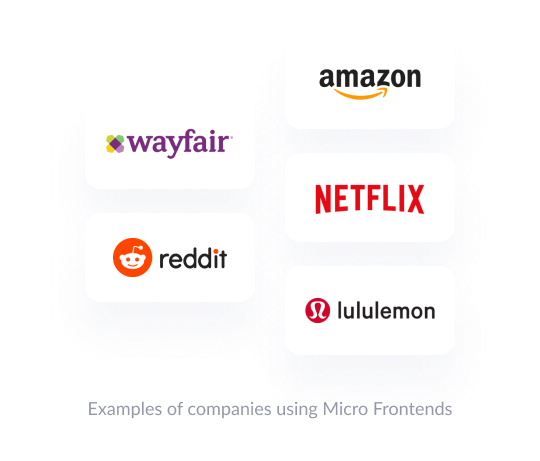Angular Micro Frontends
Implementing a micro frontend? Our team of experienced software architects can help you build a solid micro frontend architecture for your Angular applications.
Connect with us
Need a free micro frontend consultation? Bitovi's Angular experts are on standby and ready to help.



Why implement micro frontends?
Micro frontends split the frontend web application into smaller individual web applications where each individual application performs a specific functionality. These individual applications work together making up the whole web app.
Work with value-driven experts
We have experience implementing micro frontends using a variety of approaches and tools including Webpacks’s Module Federation, Single-spa.js, and Nx. Bitovi Angular consultants don't recommend technological solutions without a solid understanding of your business and product goals. Our consultants learn about your goals and pain points, and help you find an architectural approach that makes sense, be it implementing micro frontend architecture with Module Federation or simply rearchitecting your Angular code to better meet your users’ needs.

Enterprise companies use micro frontends
Many enterprise companies are adopting micro frontend Architecture to split specific features of their application into a different micro frontend and then dynamically load these features into their main application on demand. This enables them to have feature-focused teams and to ship out faster and smaller applications.

Angular Insights

How Bitovi can help you implement micro frontend architecture
-
Work with your team to analyze your current monolith frontend web application and determine the best way to break it down into micro frontend.
-
Help your team set up the network infrastructure so these micro frontend applications work together seamlessly.
-
Help your team identify the best tool to implement micro frontend architecture.
-
Restructure your current project to better support micro frontend architecture.
-
Set up End2End test for the different micro frontends.
-
Manage your team's communication.
The top benefits of working with Bitovi included access to other services, DevOps in our case, that our tech team was able to leverage, access to engineers involved in the Angular community allowing our team to stay on top of the latest trends, and flexibility to scale the team up and down as needed.

Brandon Tulsi
Senior Software Engineer, Ygrene Energy
Why Bitovi?
Decades of Angular experience and deep connections to the community make Bitovi uniquely poised to tackle your goals.
-
Experience in all Angular versions
- Whether you’re behind on the latest upgrades or just looking to get advice on your modern system, Bitovi can help provide deep feedback for your current or past Angular versions.
-
Applications of all complexities
- Bitovi has done audits with Fortune 500 companies and early stage startups. Our experts know how to tailor their advice to wherever you are in the journey.
-
Action items, not just deficiencies
- If you’re working within your web application every day, you probably know where it’s lacking. Bitovi’s audit process ensures we’re providing you prioritized, actionable tasks at the end, not just a list of problems for you to fix.
-
We can guide the whole process
- Our help doesn’t just end at the delivery of our audit. We provide everything from extra hands to subject matter experts to training for your team. We make sure you succeed in all of your goals.
What an engagement with Bitovi might look like...
1. We work with your team to analyze your current monolith frontend web application and determine the best way to break it down into micro frontend.
Our team will do a deep review of your current web application and examine each feature/functionality to determine the best way to split it into a micro frontend Architecture for optimal performance.
2. We help your team identify the best tool to implement micro frontend Architecture.
If you implement a micro frontend Architecture and fail to choose the best tool to use, it can make an already complex process more complex. Our team will help you select the best tool that is right for your project.
3. We'll set up End2End test for the different micro frontends.
We will write adequate E2E tests for the different micro frontends to make sure they are all integrated correctly. Read our intro post on testing with Cypress.

4. We'll help manage your team's communication.
One of the key pieces of implementing successful micro frontend Architecture is ensuring teams have good communication. Facilitating communication between autonomous teams can be challenging. We can help you improve team communication to ensure that each team is on the same page, create processes to help avoid code duplication, and are more equipped to deliver features rapidly.
5. We coach your team on how to restructure your current project to better support micro frontend Architecture.
We will help your team structure your application to make it perfectly suitable for a micro frontend Architecture.
6. Our DevOps experts help your team set up the Network Infrastructure/Deployment Process so these micro frontends work together seamlessly.
Our Angular engineers work hand in hand with our team of experienced DevOps Engineers to help you set up the different processes needed for your micro frontend to deploy correctly, some of these processes include:
-
Separation of µServices (micro frontend) and deployment configuration (read our recent blog post to learn more)
-
Implement a standard CD/CI process across each micro frontend which will include tests, build artifacts, deployment, etc.
-
Add hooks into pipelines to notify users/systems letting them know a particular micro frontend has been deployed.
-
Set up the Network Infrastructure which includes: Deployment repo Cloud provider access Networking (DNS, VPC, VPN, etc) Compute - Virtual machines, container orchestration, serverless, blob storage (S3).
Schedule a free consultation!
Bitovi's Angular experts are on standby and ready to help you foster success in your engineering organization.

